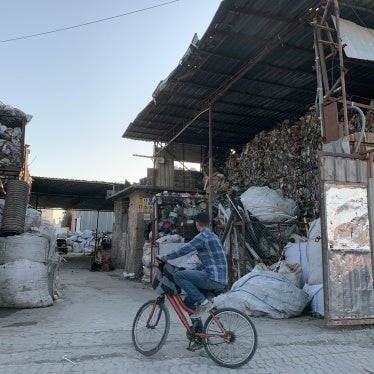On Monday, September 4, the United Nations Environment Programme published the zero draft of the new global plastics treaty. The text, based on previous negotiations, lays the foundation for a legally binding instrument to end plastic pollution and could help confront some of the harmful impacts of plastics on the environment and protection of human rights.
The draft proposes options to address the full life cycle of plastics, from reducing production to eliminating the use of the most hazardous plastics, with the goal of ending the export and recycling of plastics containing harmful chemicals – a promising first step towards a meaningful treaty.
Despite these positive elements, the draft lacks an explicit reference to human rights, promotes recycling, and omits phasing out fossil fuels as a key measure to reduce plastic production. Human Rights Watch has made a submission to the negotiating committee outlining sustainable measures, based on human rights, to address plastic pollution.
The zero draft encourages promoting higher recycling rates as a measure to enhance producer responsibility and waste management, but fails to account for the harms associated with plastic recycling. While recycling is often portrayed as a positive, environmentally friendly practice, without proper procedures, plastic recycling can release pollutants and toxins into local environments, threatening the health of those working in and living nearby recycling facilities.
UN Secretary-General António Guterres has named plastics as “fossil fuels in another form,” urging governments to take more drastic actions to reduce plastic production. Of the more than 400 million tonnes of plastics produced globally every year, 99 percent are made from fossil fuels, which are the primary driver of the climate crisis. The fossil fuel industry is projected to increasingly rely on plastic production for revenue as the movement to end fossil fuel use in other forms advances. For the new treaty to deliver a sustainable solution to end plastic pollution, it needs squarely to address the role of fossil fuels and the industry’s harms.
It is not too late for governments to propose and integrate these crucial elements. Member states’ submissions will be incorporated and discussed at the next round of negotiations in Nairobi in November. Improving waste management and recycling alone will not end the human rights harms of plastic pollution. There is only one way to ensure the new treaty addresses the ultimate source of plastic pollution: phase out fossil fuels.










